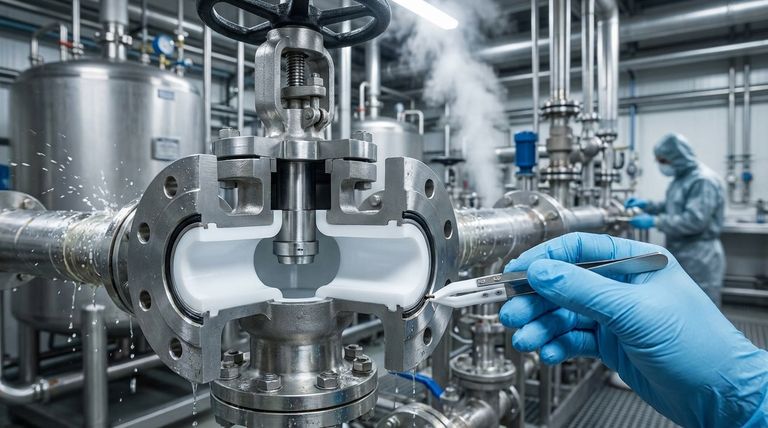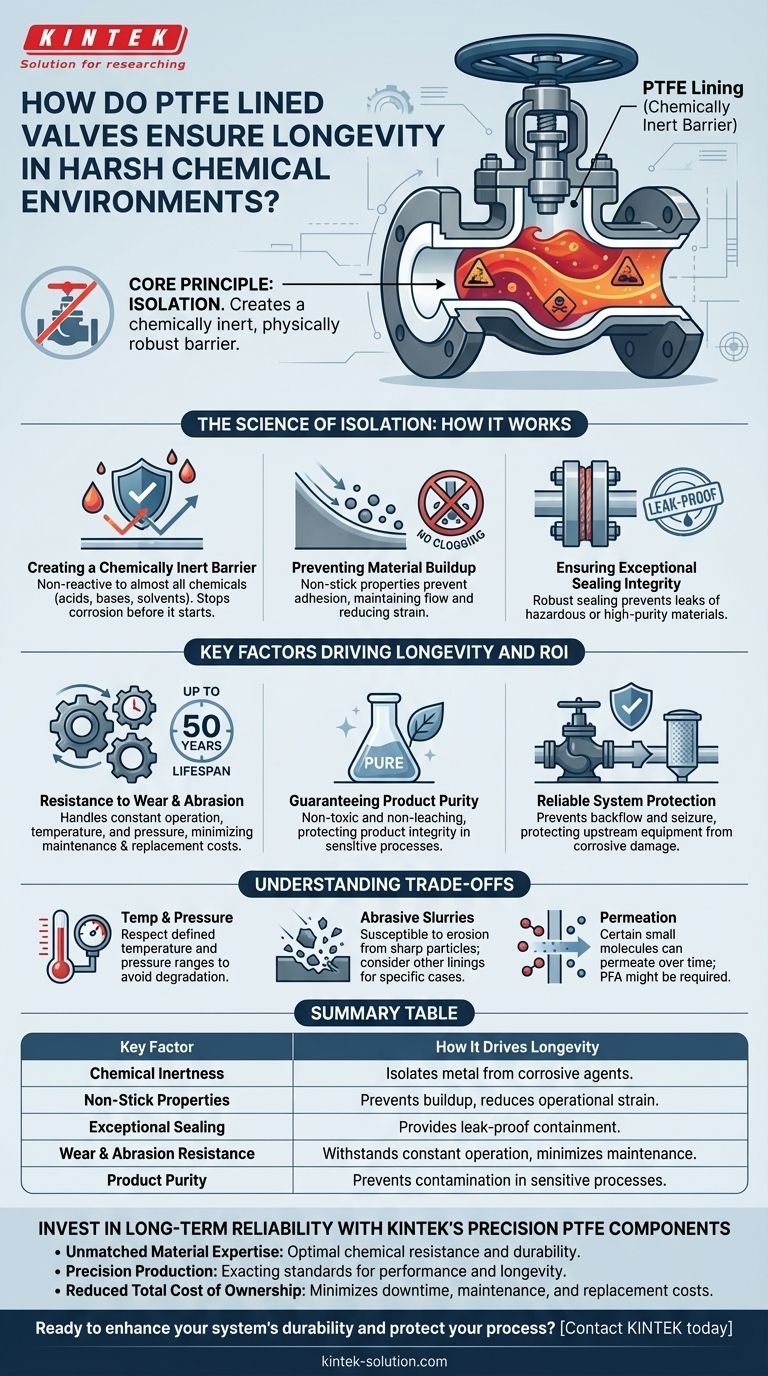At their core, PTFE lined valves ensure longevity by creating a chemically inert and physically robust barrier between the aggressive process media and the valve's structural body. This lining effectively isolates the metal components from corrosion, chemical attack, and wear, preventing the degradation that causes traditional valves to fail in harsh environments.
The true value of a PTFE lined valve isn't just its material strength; it's the creation of a near-universal barrier that guarantees both the valve's longevity and the purity of the medium it controls.

The Science of Isolation: How the Lining Works
The primary function of the PTFE lining is to completely isolate the valve's metallic body (typically cast iron, ductile iron, or stainless steel) from the process fluid. This separation is the foundation of its long-term reliability.
Creating a Chemically Inert Barrier
A PTFE lining is non-reactive with almost all industrial chemicals, including strong acids, bases, and solvents. This chemical inertness is its most critical property.
Because the lining does not react with the fluid, the valve's structural components are never exposed to corrosive agents, effectively halting the corrosion process before it can begin.
Preventing Material Buildup
PTFE is renowned for its non-stick properties. This characteristic prevents viscous or particle-laden media from adhering to the valve's internal surfaces.
This prevents clogging, maintains consistent flow characteristics, and reduces the operational strain on valve components over time, directly contributing to a longer service life.
Ensuring Exceptional Sealing Integrity
The design of PTFE lined valves provides exceptional sealing capabilities. This robust seal is critical for preventing leaks, especially with hazardous or high-purity materials.
By preventing the escape of aggressive chemicals, the valve not only protects external equipment and personnel but also avoids the gradual degradation of its own external parts and fasteners.
Key Factors Driving Longevity and ROI
While chemical inertness is the core principle, several other factors contribute to the impressive lifespan of these valves, which can reach up to 50 years with proper maintenance.
Resistance to Wear and Abrasion
The durability of the PTFE lining allows it to resist the general wear and tear of constant operation. It can handle a wide range of temperatures and pressures without degrading.
This physical resilience means less frequent need for maintenance and replacement, leading to significant long-term cost savings.
Guaranteeing Product Purity
Because PTFE is non-reactive and non-toxic, it does not leach materials or contaminate the process fluid. This is non-negotiable in industries like pharmaceuticals, semiconductors, and food and beverage.
By protecting product integrity, the valve eliminates a major failure point in sensitive processes: contamination that can lead to batch rejection and costly downtime.
Reliable System Protection
In applications like check valves, the PTFE lining ensures the valve can perform its primary safety function—preventing backflow—without risk of seizure or failure due to corrosion.
This protects upstream equipment, such as pumps and filters, from damage caused by reverse flow of corrosive chemicals, enhancing the longevity of the entire system.
Understanding the Trade-offs
No solution is universal. While highly effective, PTFE lined valves have operational boundaries that are critical to understand for proper application.
Temperature and Pressure Limitations
PTFE has a defined service temperature range. Exceeding its upper temperature limit can lead to material degradation, loss of mechanical strength, and potential failure.
Similarly, these valves have pressure ratings that must be respected. High-pressure applications may require valves made from exotic alloys rather than lined carbon or stainless steel.
Susceptibility to Abrasive Slurries
While durable, PTFE can be susceptible to erosion from highly abrasive media, such as sharp-particle slurries. In these specific cases, a ceramic or rubber-lined valve might offer a longer service life.
Permeation by Small Molecules
Certain small-molecule gases (like chlorine or hydrogen) can, over time, permeate the PTFE lining and corrode the underlying metal body. For these specific services, valves with PFA linings, which have lower permeability, are often specified.
Making the Right Choice for Your Application
Selecting the right valve requires matching its strengths to your primary operational goal.
- If your primary focus is safety and hazardous material containment: The exceptional, leak-proof sealing and chemical inertness of a PTFE lined valve is your most reliable choice.
- If your primary focus is product purity and preventing contamination: The non-reactive, non-stick, and non-toxic nature of the PTFE lining makes it essential for high-purity applications.
- If your primary focus is minimizing total cost of ownership in corrosive services: The long lifespan and drastically reduced maintenance needs of PTFE lined valves provide a clear financial advantage over replacing less-resistant valves.
Ultimately, choosing a PTFE lined valve is an investment in predictable, long-term operational stability.
Summary Table:
| Key Factor | How It Drives Longevity |
|---|---|
| Chemical Inertness | Creates a non-reactive barrier, isolating metal body from corrosive acids, bases, and solvents. |
| Non-Stick Properties | Prevents material buildup and clogging, maintaining consistent flow and reducing operational strain. |
| Exceptional Sealing | Provides leak-proof containment of hazardous materials, protecting the valve and external components. |
| Wear & Abrasion Resistance | Withstands constant operation across a wide temperature and pressure range, minimizing maintenance. |
| Product Purity | Prevents contamination in sensitive processes (e.g., pharmaceuticals, semiconductors) by being non-toxic and non-leaching. |
Invest in Long-Term Reliability with KINTEK's Precision PTFE Components
Choosing the right valve is critical for the safety, purity, and efficiency of your operations. At KINTEK, we specialize in the custom fabrication of high-performance PTFE components—including seals, liners, labware, and custom valve linings—for the semiconductor, medical, laboratory, and industrial sectors.
By partnering with us, you benefit from:
- Unmatched Material Expertise: We ensure the PTFE used in your components offers optimal chemical resistance and durability for your specific application.
- Precision Production: From prototypes to high-volume orders, our manufacturing prioritizes exacting standards to guarantee performance and longevity.
- Reduced Total Cost of Ownership: Our reliable components minimize downtime, maintenance, and replacement costs, protecting your bottom line.
Ready to enhance your system's durability and protect your process? Contact KINTEK today to discuss your project requirements and discover how our custom PTFE solutions can deliver decades of reliable service.
Visual Guide

Related Products
- Custom PTFE Parts Manufacturer for Teflon Parts and PTFE Tweezers
- Custom PTFE Parts Manufacturer for Teflon Containers and Components
- Custom PTFE Measuring Cylinders for Advanced Scientific and Industrial Applications
- Custom PTFE Square Trays for Industrial and Laboratory Use
- Custom PTFE Sleeves and Hollow Rods for Advanced Applications
People Also Ask
- What are the key material properties of PTFE that make it suitable for expansion joints? Ensure Long-Term Reliability in Demanding Systems
- Why is mineral-filled PTFE used in medical and food industries? | Superior Durability Meets FDA-Compliant Safety
- What are the practical advantages of ePTFE gaskets in installation? Simplify Sealing with On-Site Fabrication
- How can PTFE be customized for specific applications? Tailor Performance with Fillers & Fabrication
- What material was considered as an alternative to Turcite for making fork bushes, and why? Uncover the PTFE vs. Acetal Trade-off
- How can the lifespan and performance of PTFE bars be maintained? A Guide to Proactive Care
- What are the unique properties of expanded PTFE? Unlock Superior Sealing and Filtration Performance
- What are the different grades of Teflon (PTFE) and their applications? A Guide to Material Selection



















